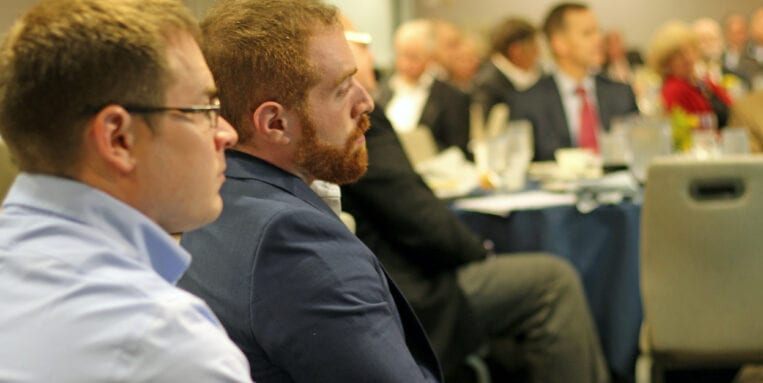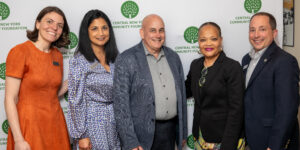
Continuing Education Event
Each fall, we host an annual continuing education breakfast for professional advisors to learn more about charitable giving tools and techniques. This serves as an appreciation event for our professional advisor network in Central New York. View our event calendar for information on this year’s event.
The following topics were featured over the past few years. You can contact Pragya Murphy at pmurphy@cnycf.org for a copy of presentation materials from these previous events.
2024: The New Normal for Charitable Tax Planning with Justin Miller, J.D., LL.M., TEP, AEP®, CFP®
Recent tax reform complicates strategies for tax-efficient charitable contributions. Using actual client experiences, this presentation explores practical solutions and innovative ways to help donors evaluate their options and make good decisions about tax-effective giving. During the program, you’ll get an in-depth look at charitable IRA rollovers, legacy IRAs, CRUTs, CRATs, CLATs, charitable gifts from trusts and estates, private foundation investment tax, donor advised fund distribution requirements, program-related and SRI investments, purpose trusts, 501(c)(4) social welfare organizations, and “charitable LLCs.” Click here to watch the video playback.
2023: Tax-Advantaged Business Sales and Charitable Case Studies with Tiffany House CAP®, CEPA, FCEP
We are entering the largest wealth transfer in history as the Baby Boomers (the most entrepreneurial generation) retire and leave their legacy. Entrepreneurs are the most philanthropic group of people and most of their wealth is tied up in their businesses. These factors are creating the perfect storm for gift planning. In this presentation, we will graphically explore tax advantaged planning tools and discuss when they can apply to certain types of businesses and owners’ circumstances. We will go over real life case studies of business sales, with details on the process of determining the best outcomes for the business owner and society. Click here to watch the video playback.
2022: TAX-SMART CHARITABLE GIVING, ESPECIALLY WITH RETIREMENT ASSETS with Professor Chris Hoyt, JD
In this exciting presentation, Professor Chris Hoyt discusses charitable giving and retirement assets. He explores why it has become more challenging to receive tax benefits from charitable gifts after 2017 as well as the benefits of donor-advised funds, qualified charitable contributions, tax-exempt charitable remainder trusts and more. You will learn to help your clients and grow your practice using charitable planning with special retirement tips. Click here to see the video playback.
2021: SPECIAL CHARITABLE PLANNING OPPORTUNITIES FOR 2021 & REVEALING RESEARCH TO MOTIVATE YOUR CLIENTS BY RUSSELL JAMES, J.D., PH.D., CFP®
In this presentation, Dr. James discussed special charitable financial planning opportunities for 2021. Pandemic, market fluctuations, interest rate changes, SECURE Act tax law — the changes never stop! But with change comes opportunity. This combination of circumstances has led to some attractive opportunities for clients with charitable interests. Additionally, Dr. James shared the Top 10 charitable planning strategies for financial advisors under the new tax law and the SECURE Act. Participants learned to help clients and grow their practice using charitable planning with special tips related to the new tax law. Click here to see the video playback.
2020: Market and Legislation Impacts on Planning by Marc Penziner AND Tara Popernik
In this session, we discussed financial investment trends and charitable giving; the charitable impact of tax law changes such as the Tax Cut & Jobs Act of 2017, the SECURE Act of 2019, and the recent CARES Act; as well as the effects of the COVID-19 outbreak. Our investment experts also shared their best tax-planning ideas for business owners and other high net worth investors along with a market update.
2019: Wealth Management for a Brave New World by E. Hugh Magill
The structure of the family has changed dramatically since the 1950’s, when many of our traditional estate, charitable and financial planning strategies were developed. This presentation provides an overview of changing generational attributes, marital practices and family structures, and examine their implications for planning, trust design and family collaboration and governance.
2018: Charitable Remainder Trusts by Phillip L. Burke, Esq.
A charitable remainder trust (CRT) can be an excellent way for a donor to create an income stream. When interest rates are increasing, the CRT may become an even better tool because increasing rates improve the charitable deduction received by the donor. This program will help you understand different types of CRTs and when they are useful in your planning for clients including best practices and case studies.
2017: Practical Charitable Planning by Pamela Jones Davidson, J.D.
This program will help you achieve your clients’ personal planning and charitable objectives by identifying who should consider charitable plans, when they should do so and which assets they should contribute. These plans can be built to maximize advantages by furthering estate, tax, retirement and financial planning goals during one’s lifetime or after one’s passing through estate planning.
2016: Stupid Charitable Tricks: Planning Mistakes I Have Seen by Ramsay Slugg
Well-intentioned gifts to charity may produce unexpected bad results, for both the donor and the charity. Often the gifted asset is not the most tax efficient asset to give. Further, increasingly complex investment and compensation structures often disguise the true nature of an asset leading to a reduced charitable deduction for the donor and unexpected tax consequences for the charity.
2015: Successful Charitable Gifts of Real Estate by Michael Degenhart
Real estate represents a large portion of our net worth, but it is often one of the last types of charitable gifts to be considered. This session uses case studies to cover the range of options for gifting real estate from basic approaches to creative charitable planning techniques. Attendees learned to recognize real estate gift opportunities as well as understand the real estate gift process. When used in conjunction with other charitable gifts including life insurance and investments, real estate gifts can maximize the donor’s charitable impact as well as distribute assets effectively to their heirs.



